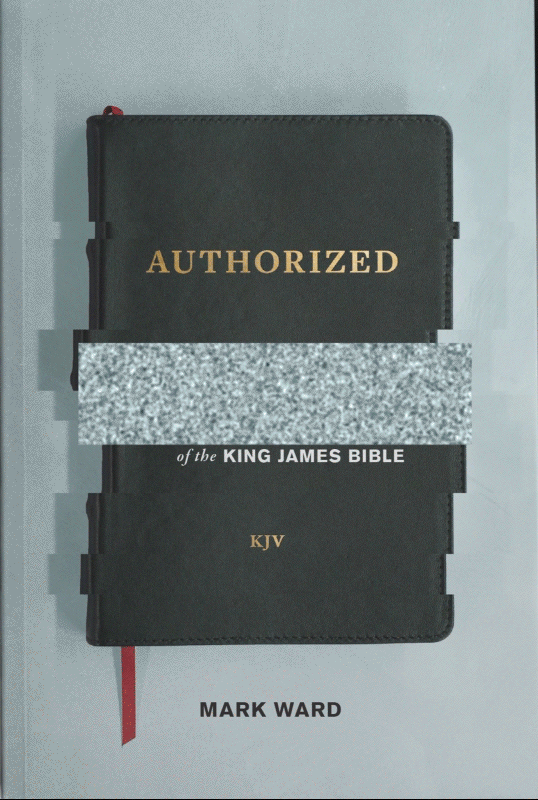The King James Bible Study Project is a national phone survey that ran from November, 2022, through April, 2023. It is designed to assist churches in evaluating the current readability level of the King James Bible.
Survey respondents were 100 pastors who preach and teach exclusively from the King James Bible.
The King James Bible Study Project is a national phone survey that ran from November, 2022, through April, 2023. It is designed to assist churches in evaluating the current readability level of the King James Bible.
Survey respondents were 100 pastors who preach and teach exclusively from the King James Bible.
The first ten questions on the survey were about pronouns. Countless defenders of the King James have pointed out—correctly—that the second-person pronouns in it are more accurate than contemporary English pronouns. The KJV distinguishes singular (thee, thy, thine) from plural (ye, you, your) whereas contemporary English has only one pronoun (you, your) that must do double duty; context must indicate if a given instance is singular or plural.
Numerous defenders of the KJB insist that this distinction is utterly crucial, sufficient by itself to keep them away from contemporary English translations. A real life example:

Screenshot of online discussion among KJV-Onlyists who are evaluating the new Simplified King James Version.
But do King James Only pastors remember and use the relevant grammatical rule? Do they understand the difference between thee and you in the KJB?
We asked 100 KJV-Only pastors to name the number (singular or plural) of ten second-person pronouns in the King James Bible. Here are the results:
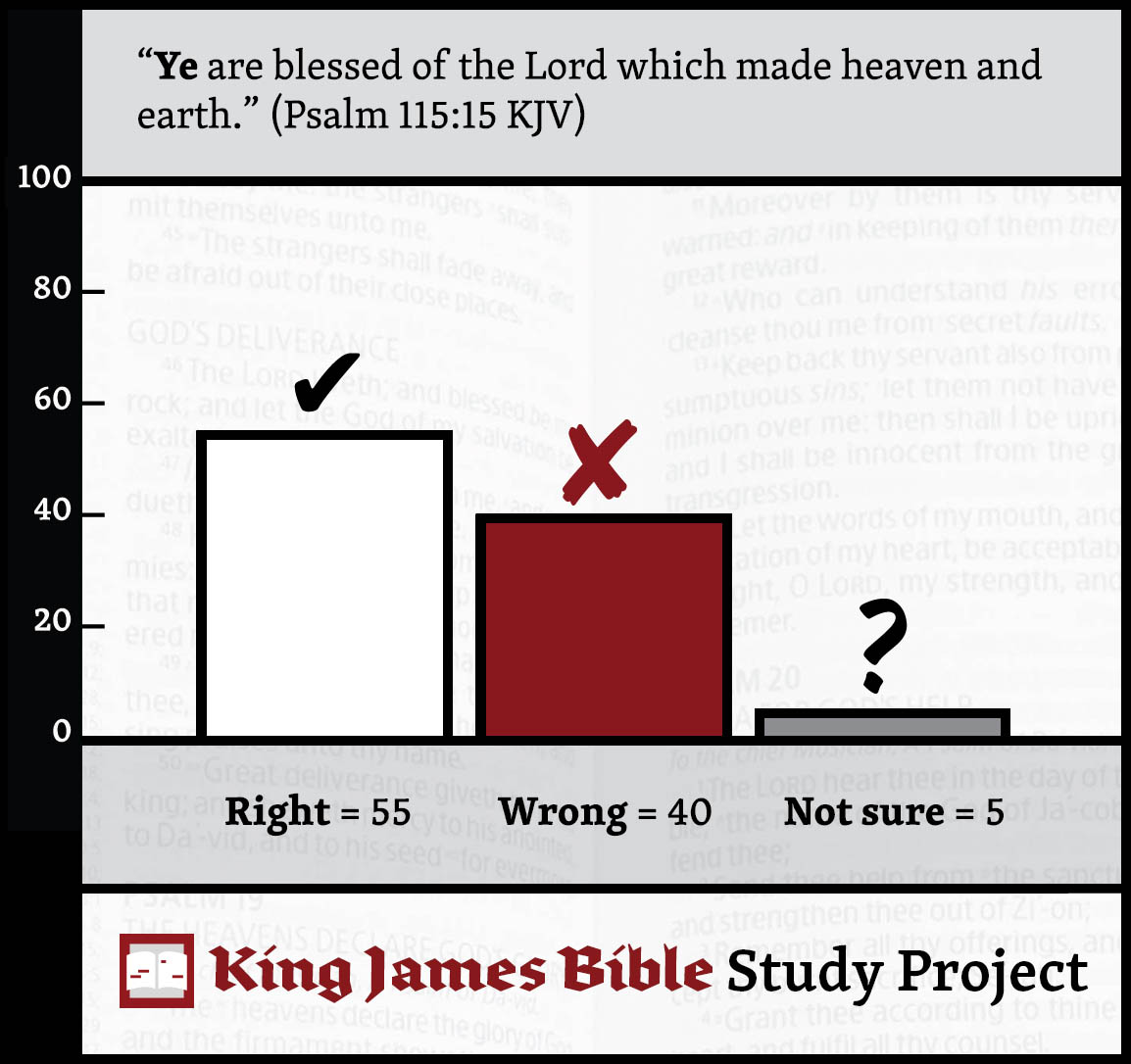
Question
Is “ye” singular or plural?
Correct Answer
“Ye” is plural—because y- second-person pronouns (ye, you, your) are plural in the English of the KJV and t- second-person pronouns (thee, thy thine) are singular.
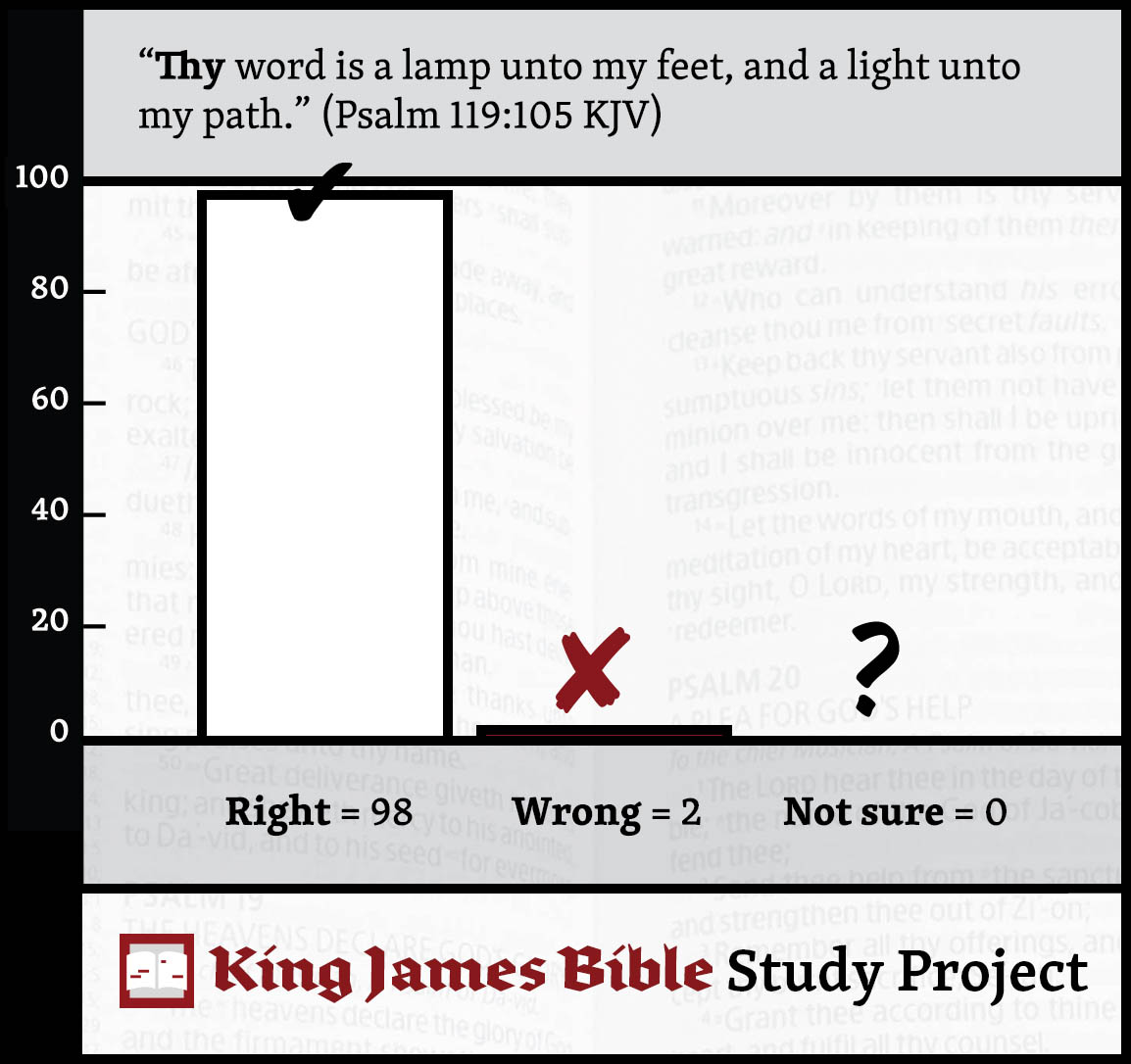
Question
Is “thy” singular or plural?
Correct Answer
“Thy” is singular—because y- second-person pronouns (ye, you, your) are plural in the English of the KJV and t- second-person pronouns (thee, thy thine) are singular.
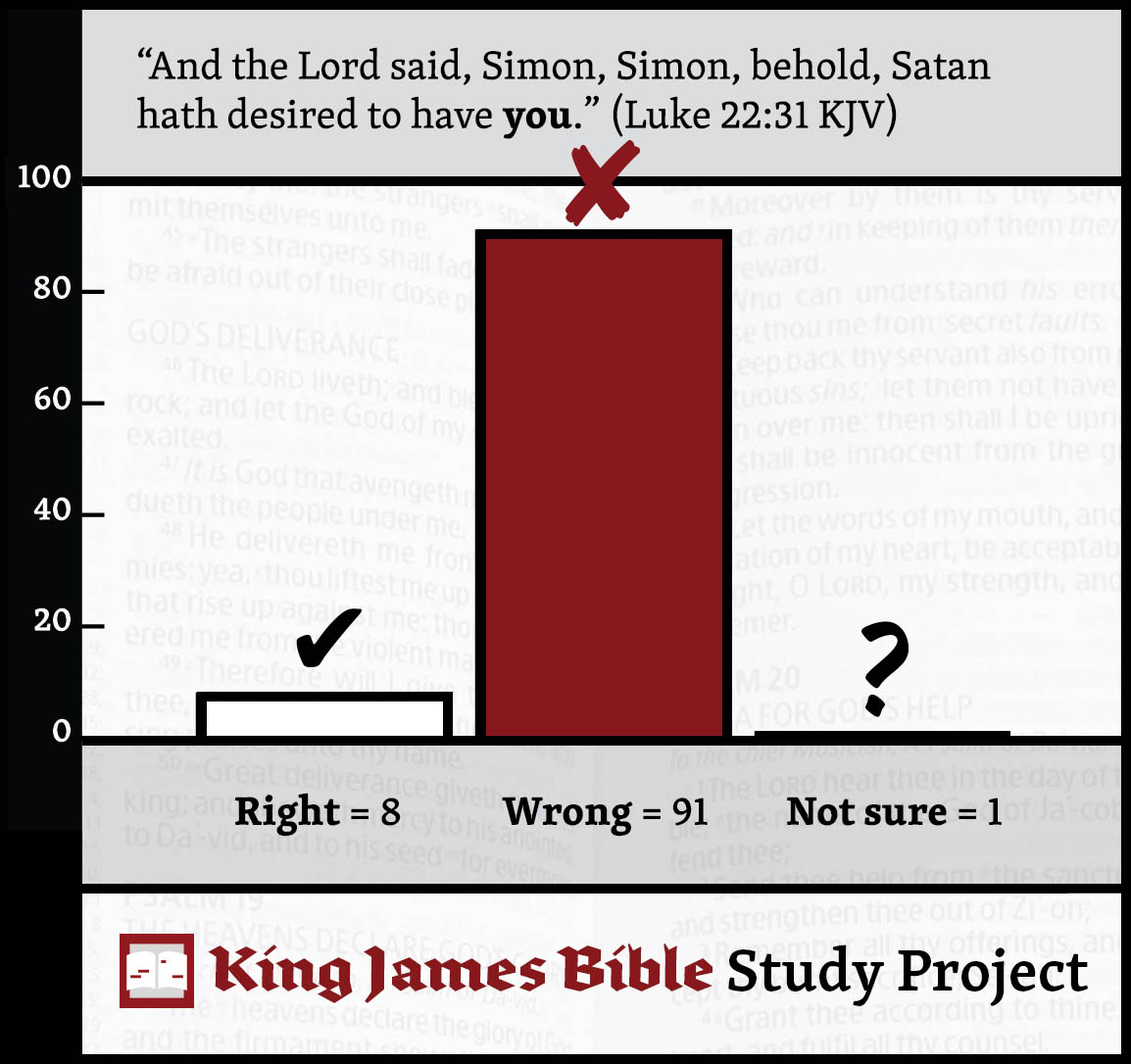
Question
Is “you” singular or plural?
Correct Answer
“You” is plural—because y- second-person pronouns (ye, you, your) are plural in the English of the KJV and t- second-person pronouns (thee, thy thine) are singular.
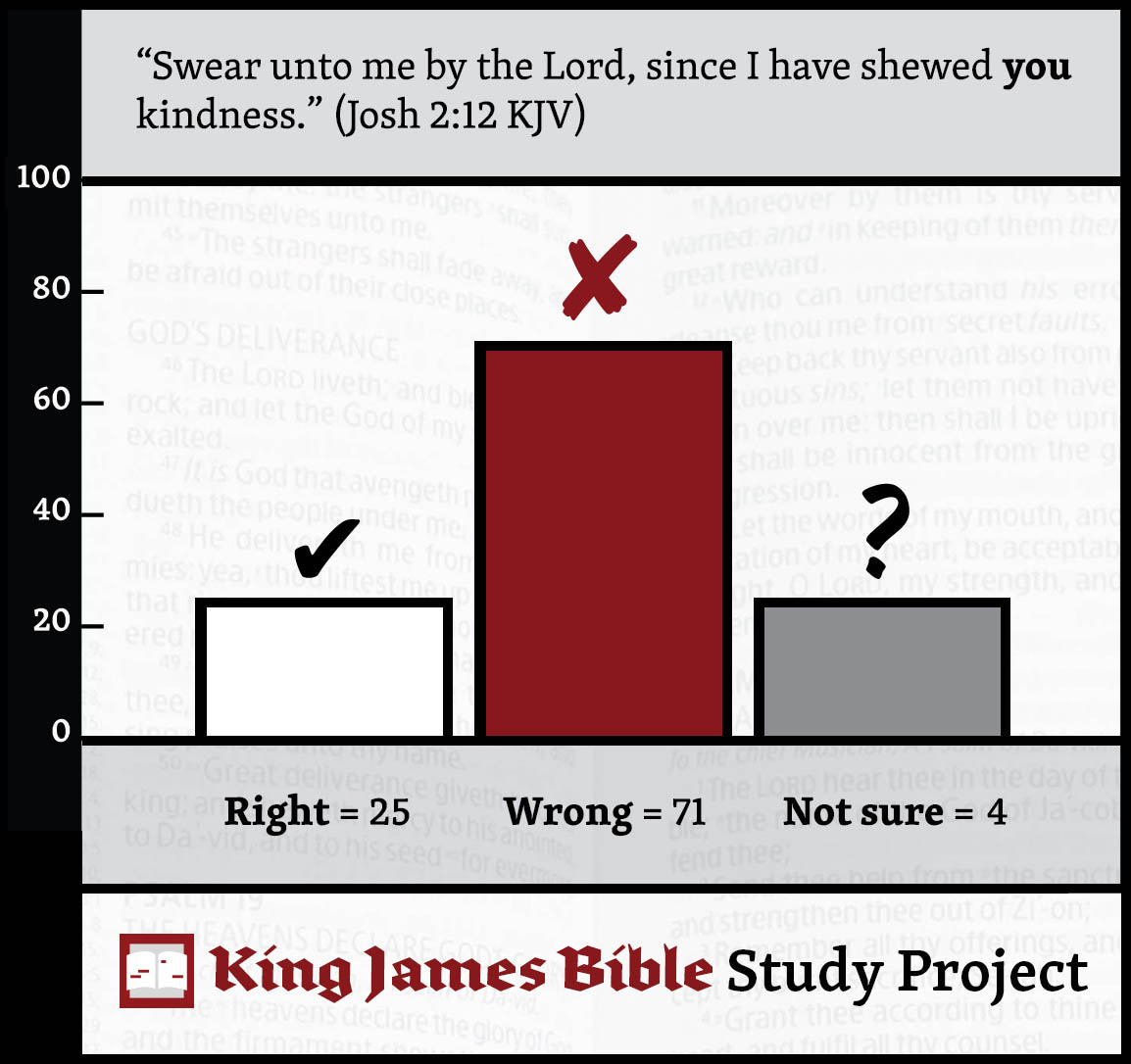
Question
Is “you” singular or plural?
Correct Answer
“You” is plural—because y- second-person pronouns (ye, you, your) are plural in the English of the KJV and t- second-person pronouns (thee, thy thine) are singular.

Question
Is “your” singular or plural?
Correct Answer
“Your” is plural—because y- second-person pronouns (ye, you, your) are plural in the English of the KJV and t- second-person pronouns (thee, thy thine) are singular.
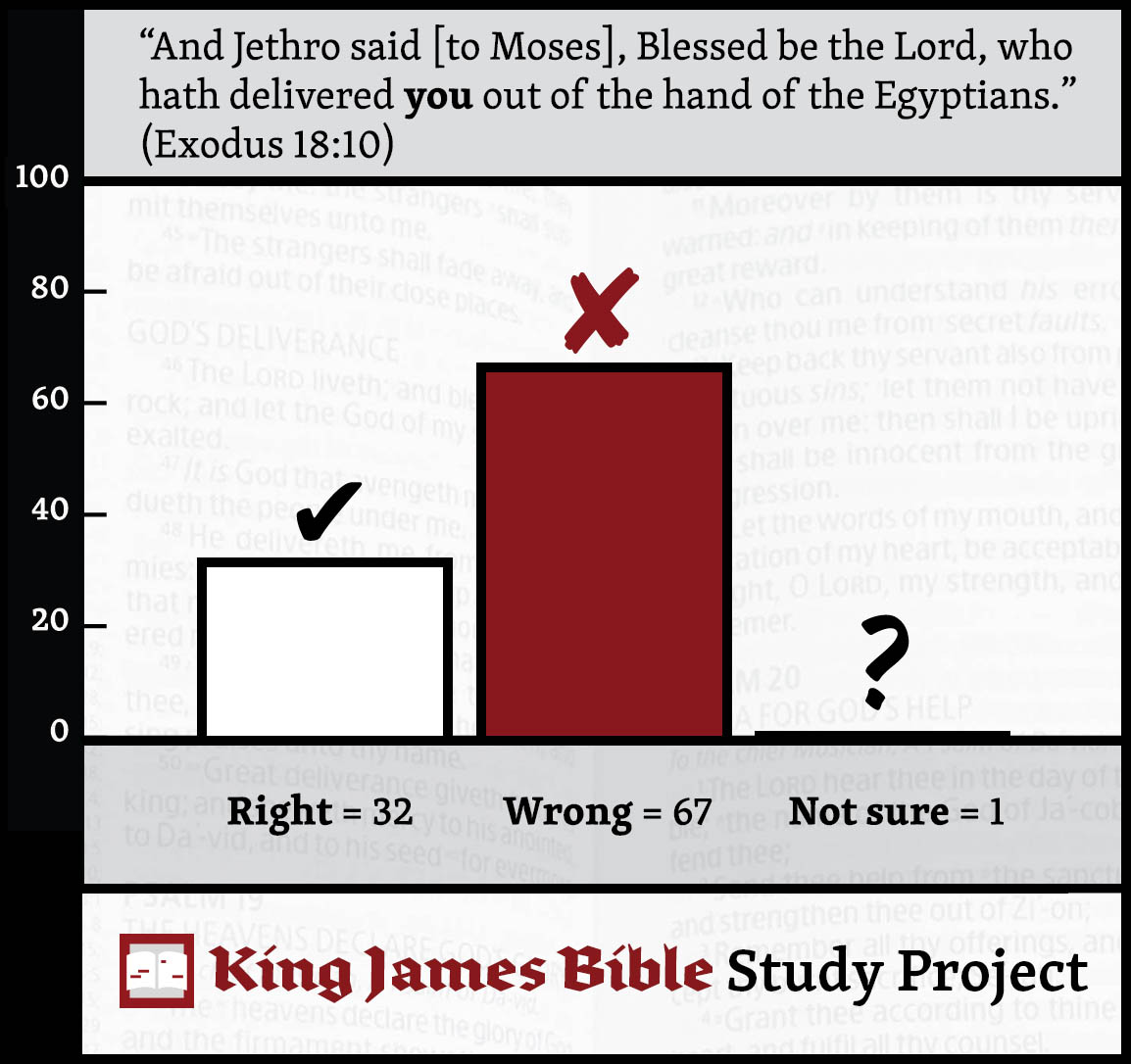
Question
Is “you” singular or plural?
Correct Answer
“You” is plural—because y- second-person pronouns (ye, you, your) are plural in the English of the KJV and t- second-person pronouns (thee, thy thine) are singular.
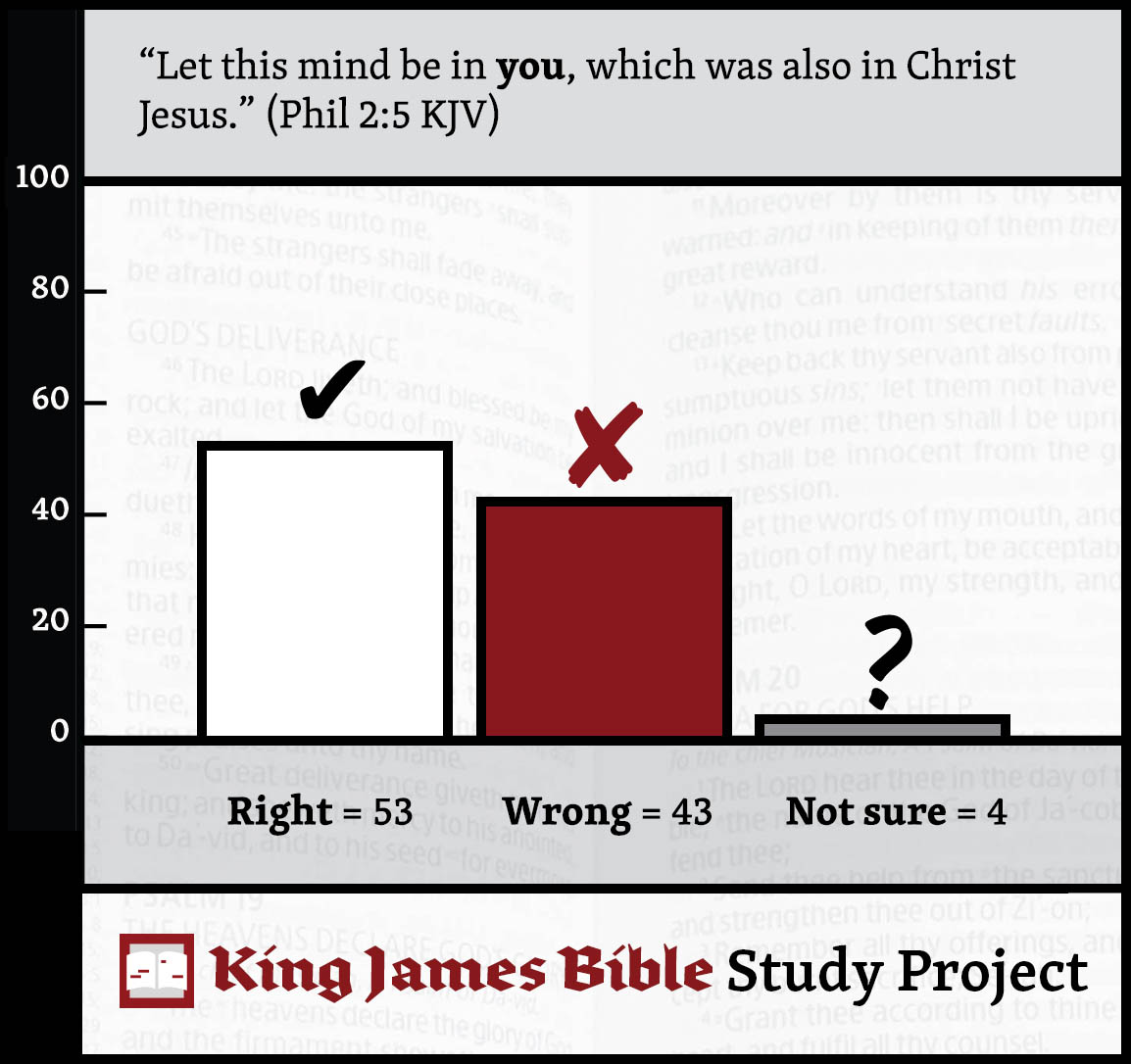
Question
Is “you” singular or plural?
Correct Answer
“You” is plural—because y- second-person pronouns (ye, you, your) are plural in the English of the KJV and t- second-person pronouns (thee, thy thine) are singular.
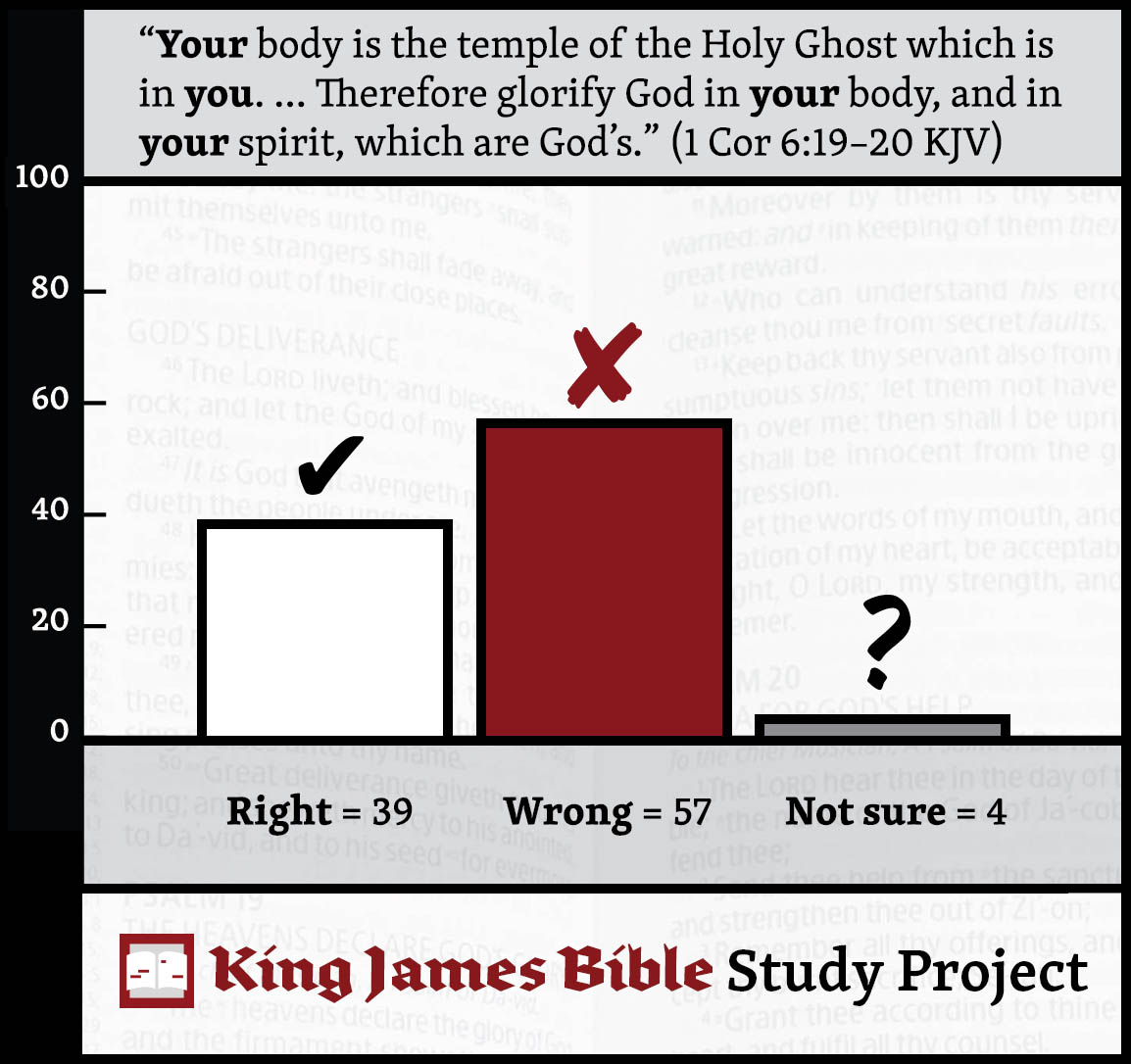
Question
Are “your” and “you” singular or plural? (All four instances are one or the other.)
Correct Answer
“Your” and “you” are plural—because y- second-person pronouns (ye, you, your) are plural in the English of the KJV and t- second-person pronouns (thee, thy thine) are singular.
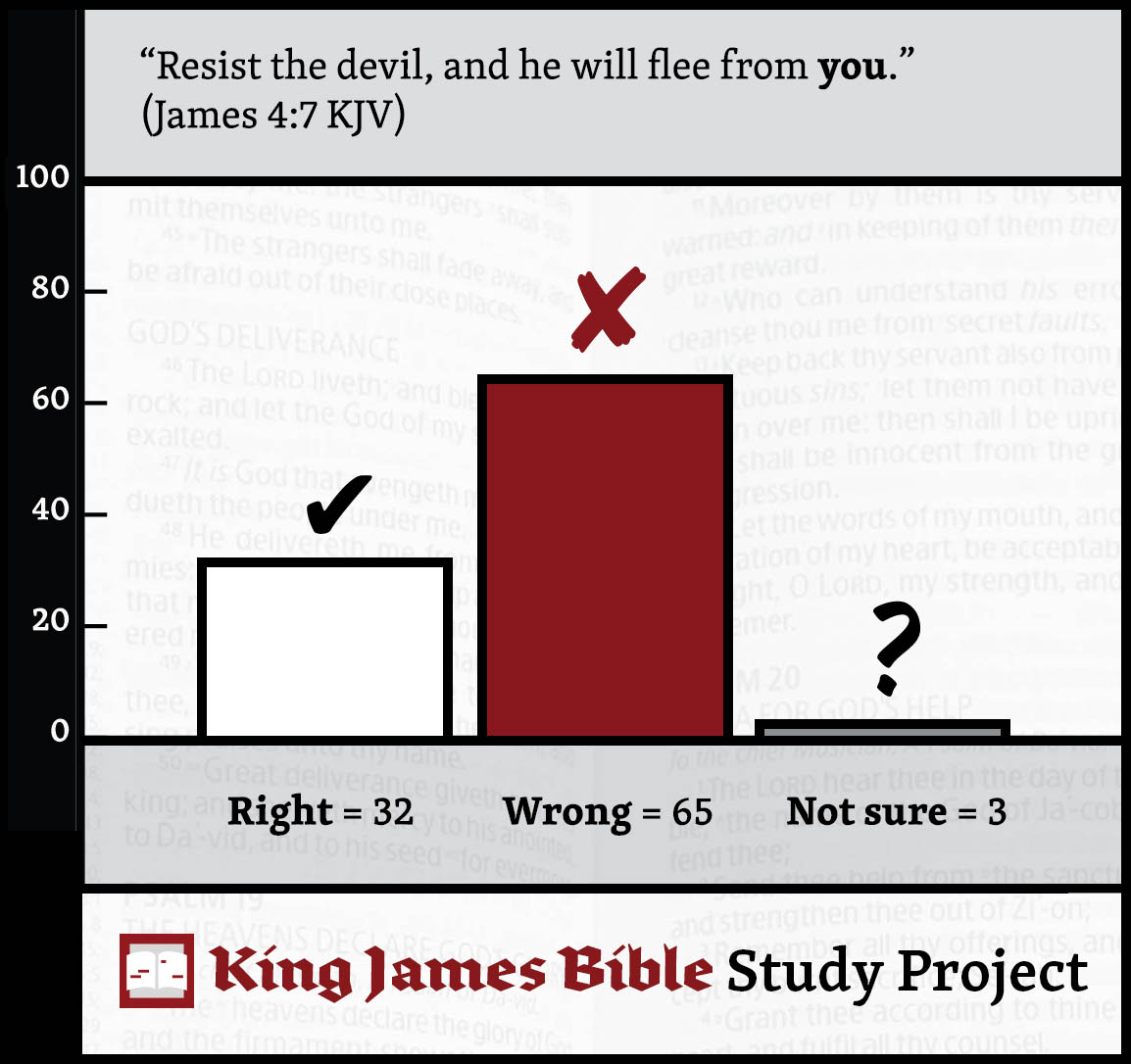
Question
Is “you” singular or plural?
Correct Answer
“You” is plural—because y- second-person pronouns (ye, you, your) are plural in the English of the KJV and t- second-person pronouns (thee, thy thine) are singular.
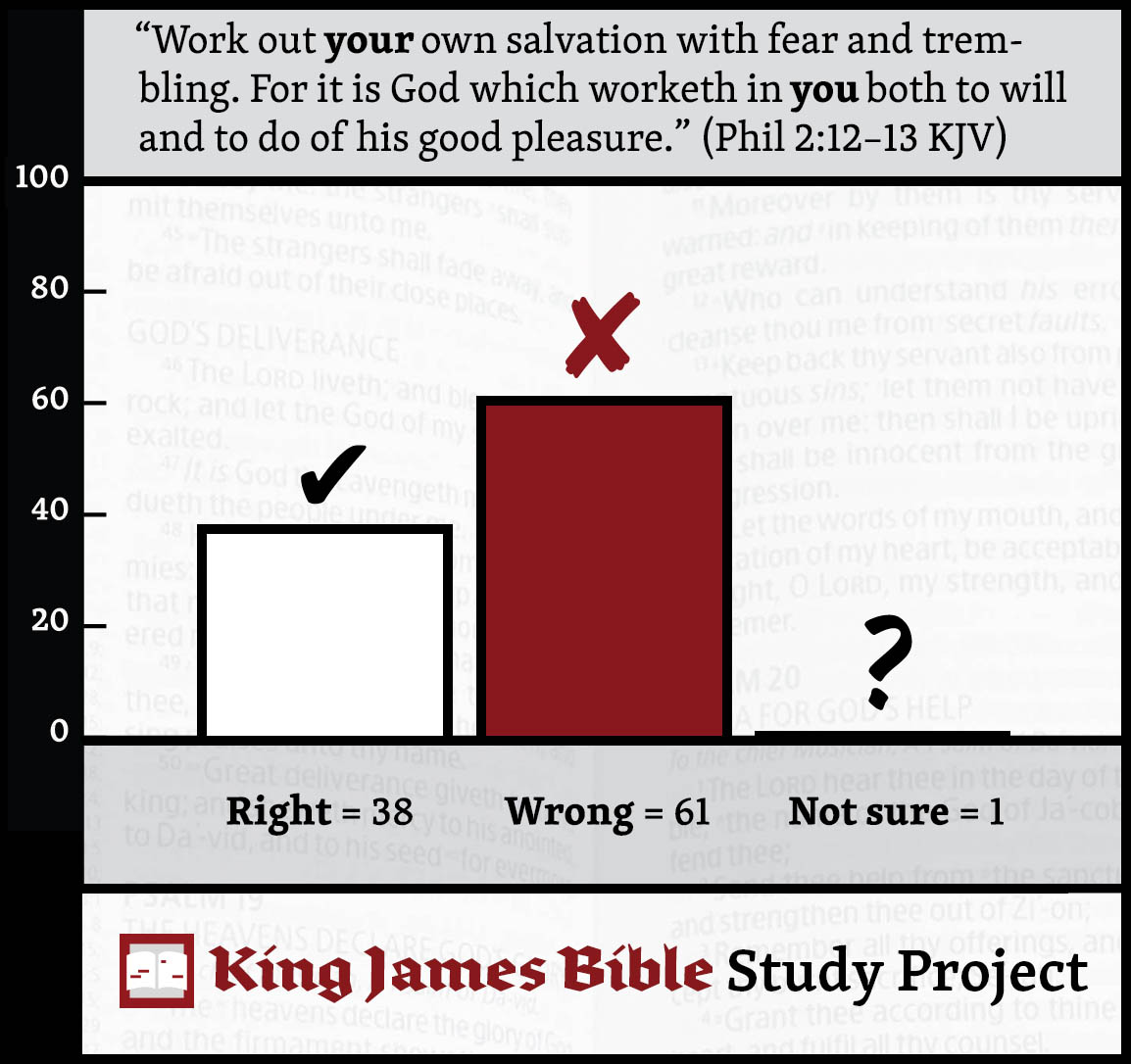
Question
Are “your” and “you” singular or plural? (Both instances are one or the other.)
Correct Answer
“Your” and “you” are plural—because y- second-person pronouns (ye, you, your) are plural in the English of the KJV and t- second-person pronouns (thee, thy thine) are singular.
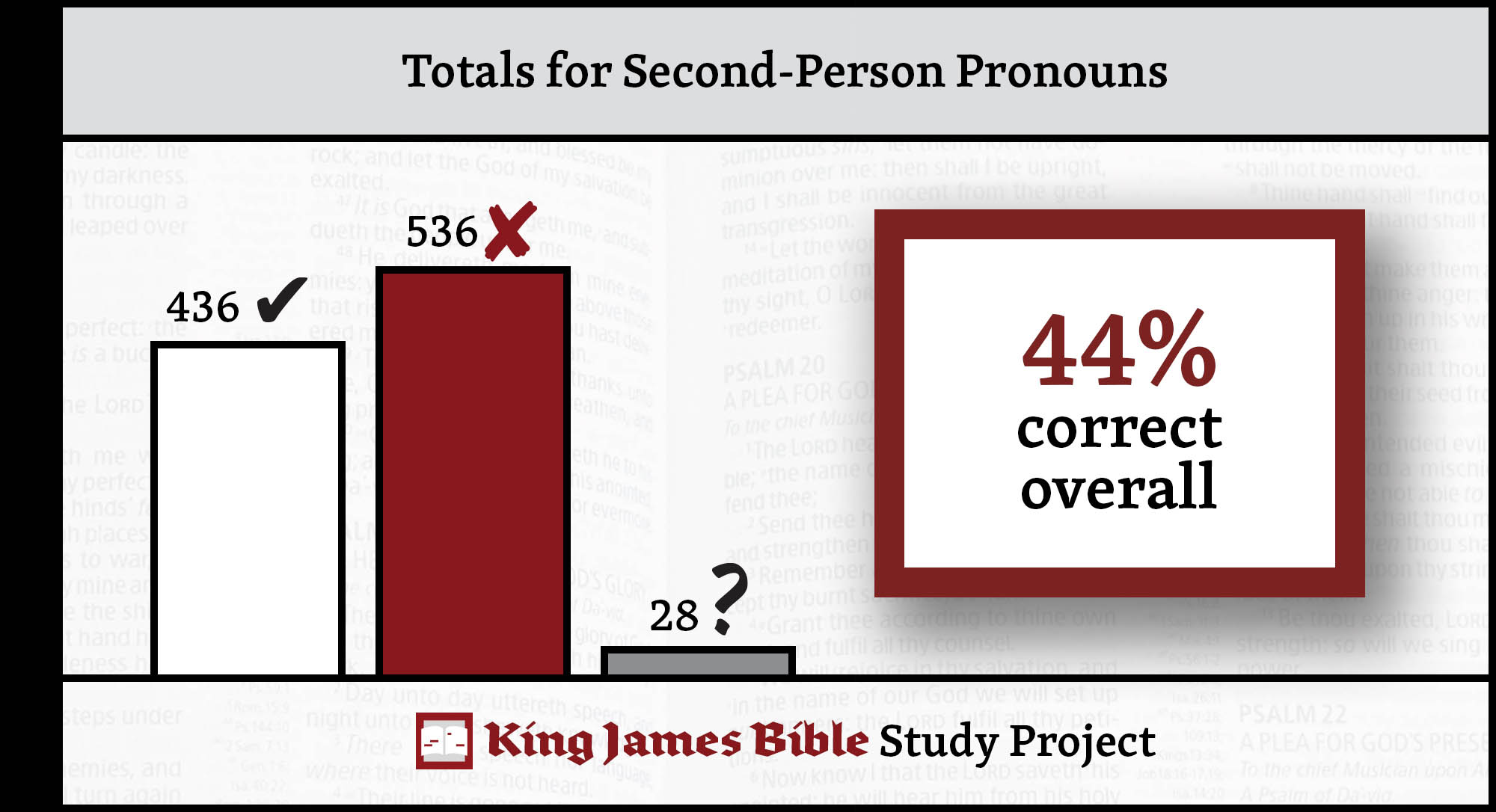
Full video explanation and assessment from Mark Ward of the second-person pronoun portion of the survey.
The final ten questions on the survey regarded “false friends,” words in KJV English that, because of language change over more than four centuries, contemporary readers often misunderstand without realizing it.
The 100 KJV-Only pastors were asked to give short answers to the questions below. The relevant verses were read out loud to them on the phone. They were offered the opportunity to look at a Bible or to hear the verses read to them again. Their answers were recorded and can be found in a table on the Full Survey Responses page.
Here’s how they did (and note the explanations under each graph):

Question
What is a “help meet”?
Correct Answer
- The Hebrew here means “helper suitable for.”
- In 1611 a “help meet” means a “helper suitable”–just like the Hebrew.
- Today, because of the fame of the KJV, “helpmeet” has become a word in its own right, meaning “a helpful companion or partner, especially one’s husband or wife” (NOAD). This is just what the KJV-Only pastors tended to think the words meant. In other words, they saw “help meet” as one word meaning “wife.” They confused sense and reference.
Watch a video explaining this false friend
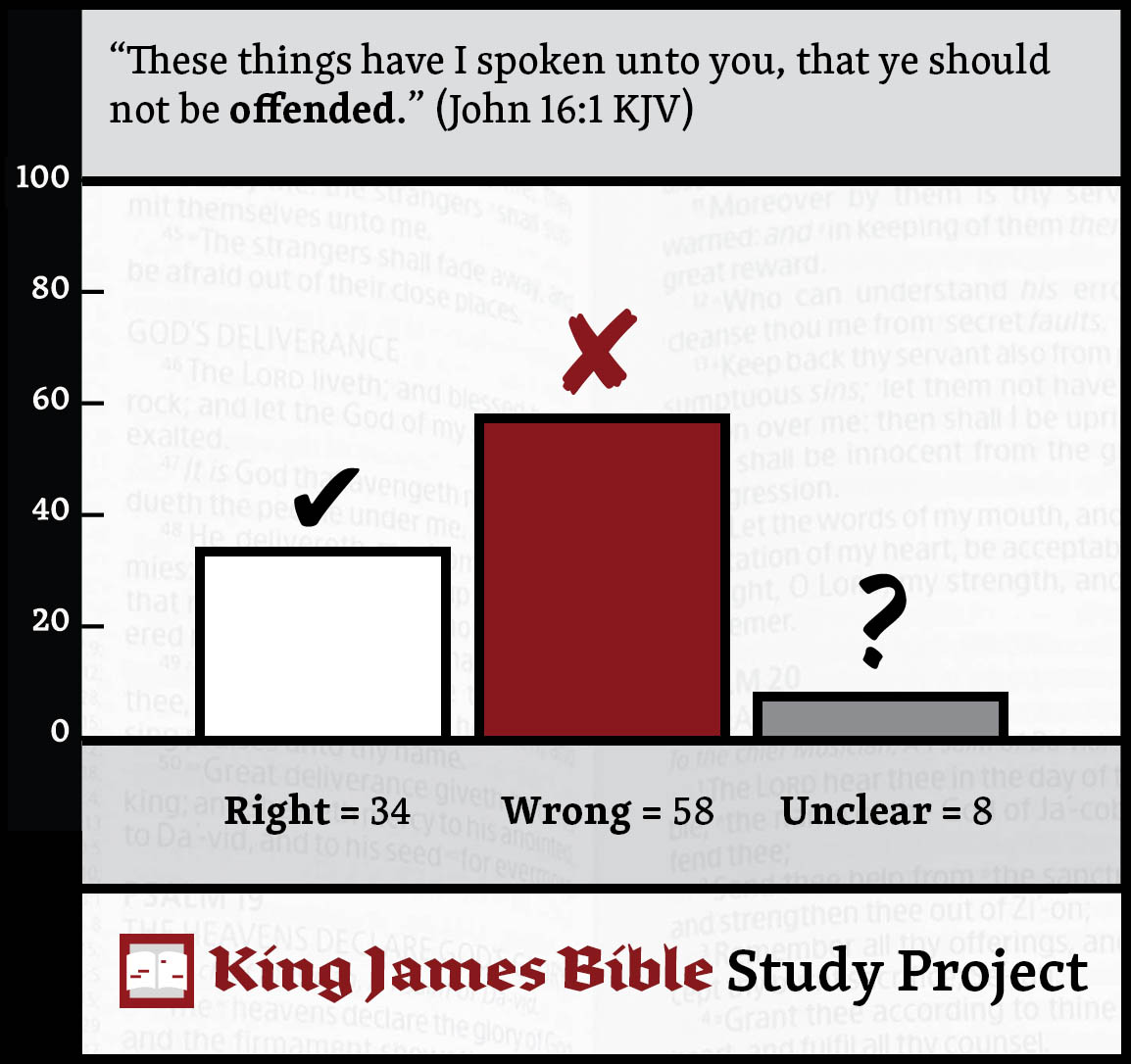
Question
What does “offended” mean?
Correct Answer
- The Greek here means “to cause to be brought to a downfall” (BDAG).
- In 1611 “offended” in a context like this meant “to be caused to stumble or make a false step; to be spiritually or morally shocked” (OED)–just like the Greek.
- Today, “offended” tends to mean “resentful or annoyed, typically as a result of a perceived insult” (NOAD). This is just what the KJV-Only pastors tended to think the word meant.
Watch a video explaining this false friend
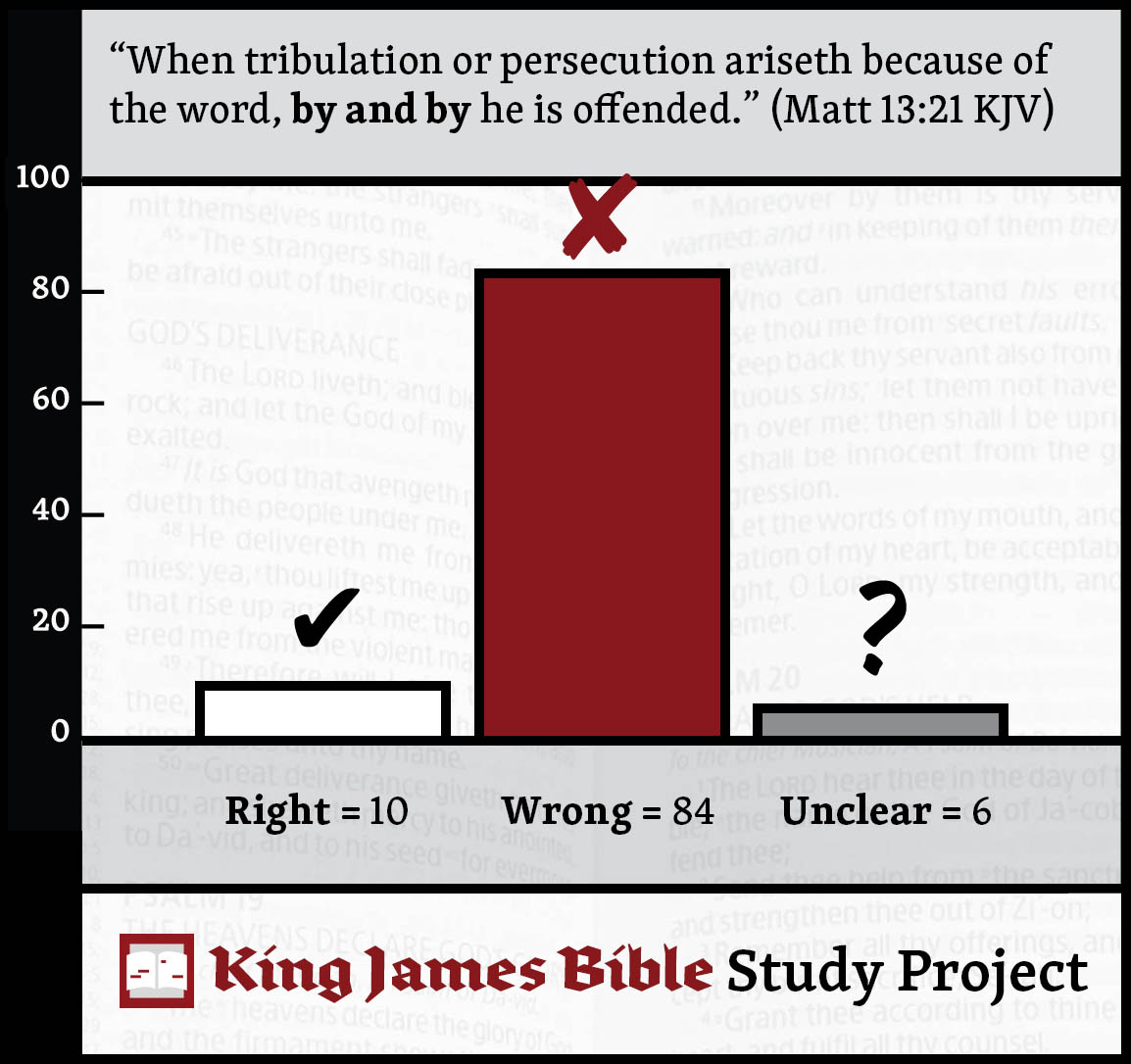
Question
What does “by and by” mean?
Correct Answer
- The Greek here means “immediately” (BDAG).
- In 1611 “by and by” in a context like this meant “straightway, immediately, directly, at once” (OED)–just like the Greek. That sense, however, is marked as “Obsolete” in the OED.
- Today, “by and by” mean “before long, eventually” (NOAD). This is just what the KJV-Only pastors tended to think the phrase meant.
Watch a video explaining this false friend
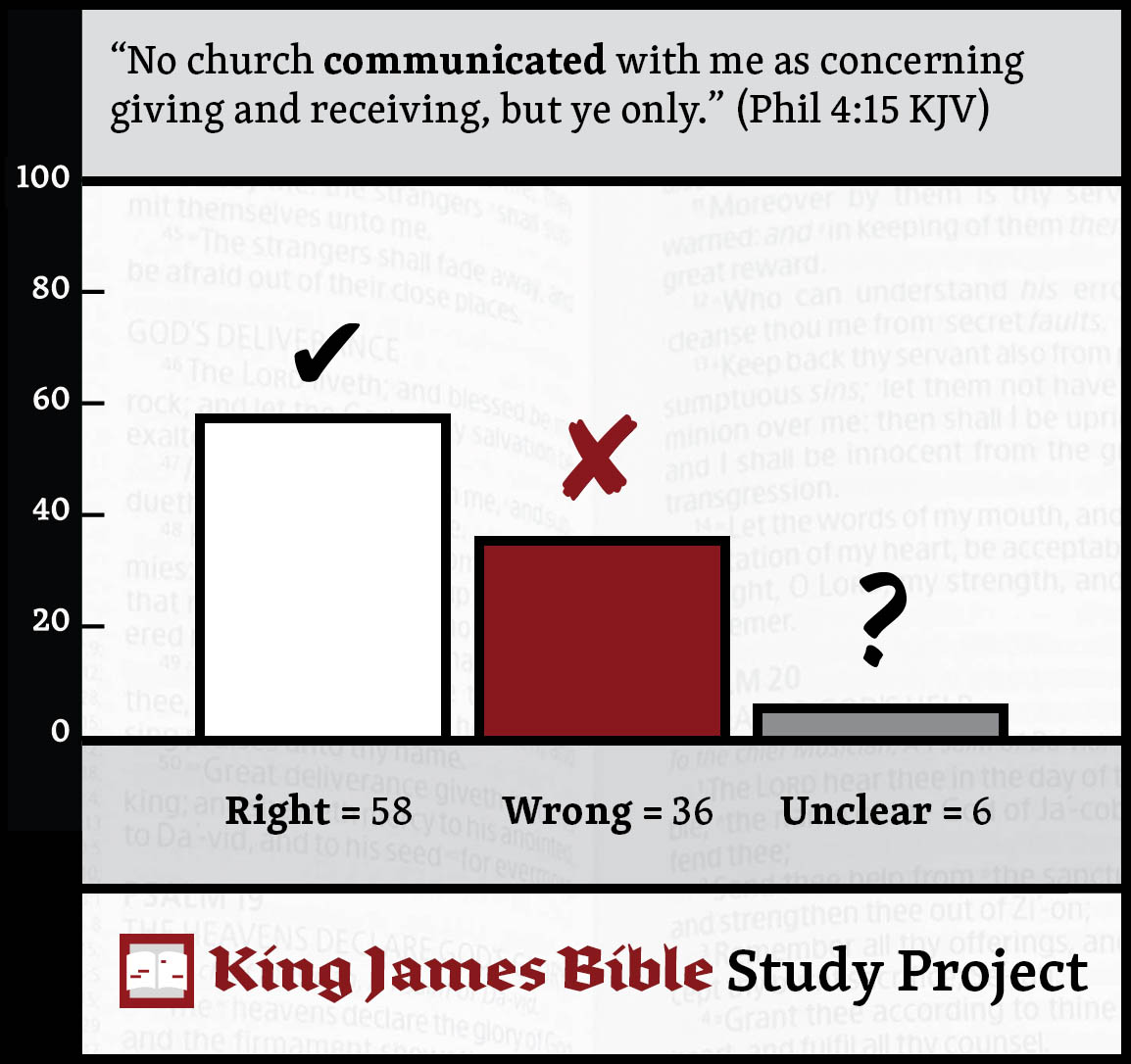
Question
What does “communicated” mean?
Correct Answer
- The Greek here means “give/contribute a share” (BDAG).
- In 1611 “communicated” in a context like this meant “to share with (either as giver or as recipient)” (OED)–just like the Greek. That sense, however, is marked as “Obsolete” in the OED.
- Today, “communicated” in a context like this more naturally means “share or exchange information” (NOAD). This is just what the KJV-Only pastors tended to think the phrase meant—when they got it wrong, which many did not. The pastors did well with this one.
Watch a video explaining this false friend
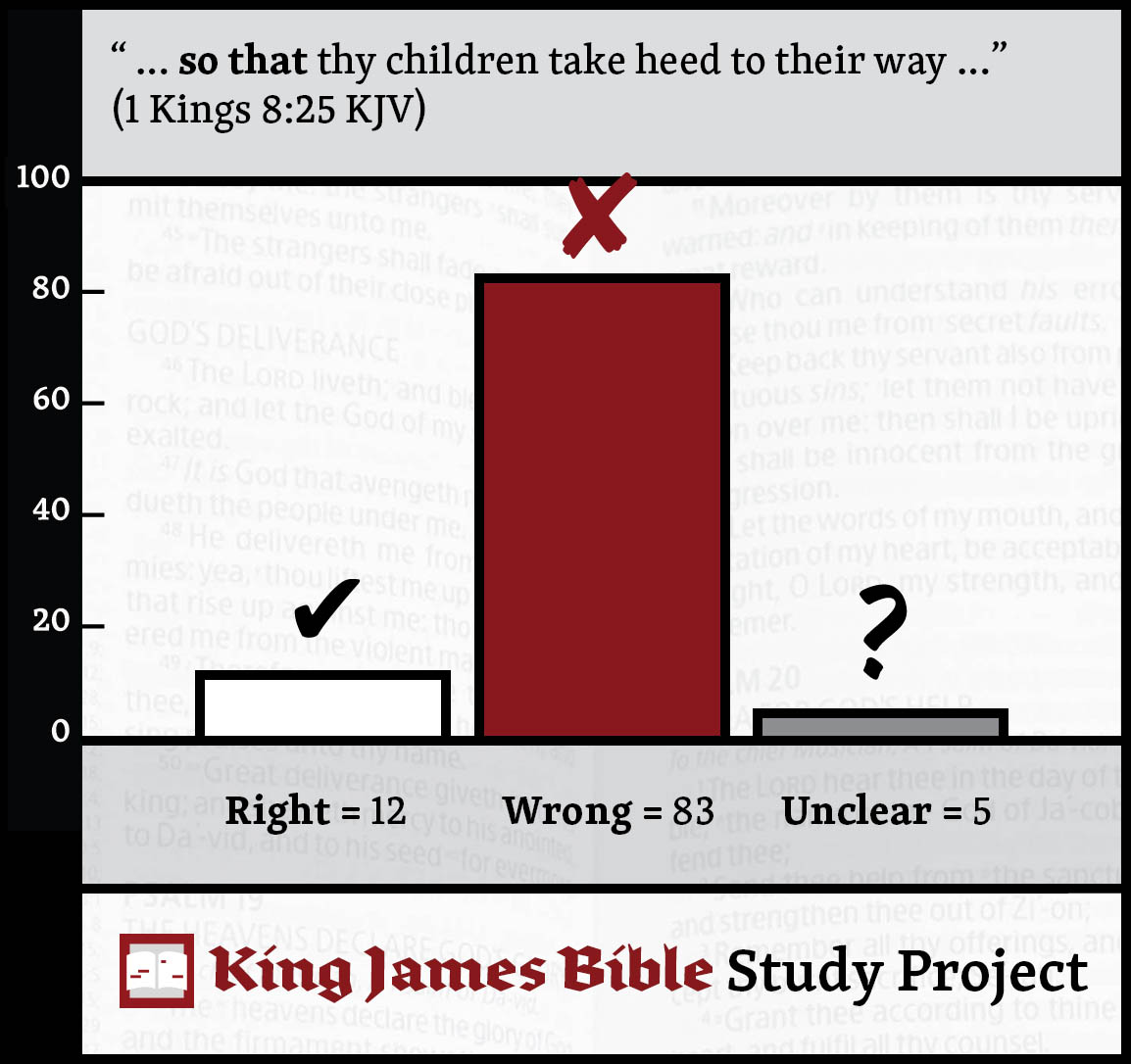
Question
What does “so that” mean?
Correct Answer
- The Hebrew here means “if only” (HALOT).
- In 1611 “so that” in a context like this meant “On condition that, provided that, so long as, if only” (OED)–just like the Hebrew.
- Today, “so that” means “in order that” (NOAD). This is just what the KJV-Only pastors tended to think the phrase meant.
Watch a video explaining this false friend
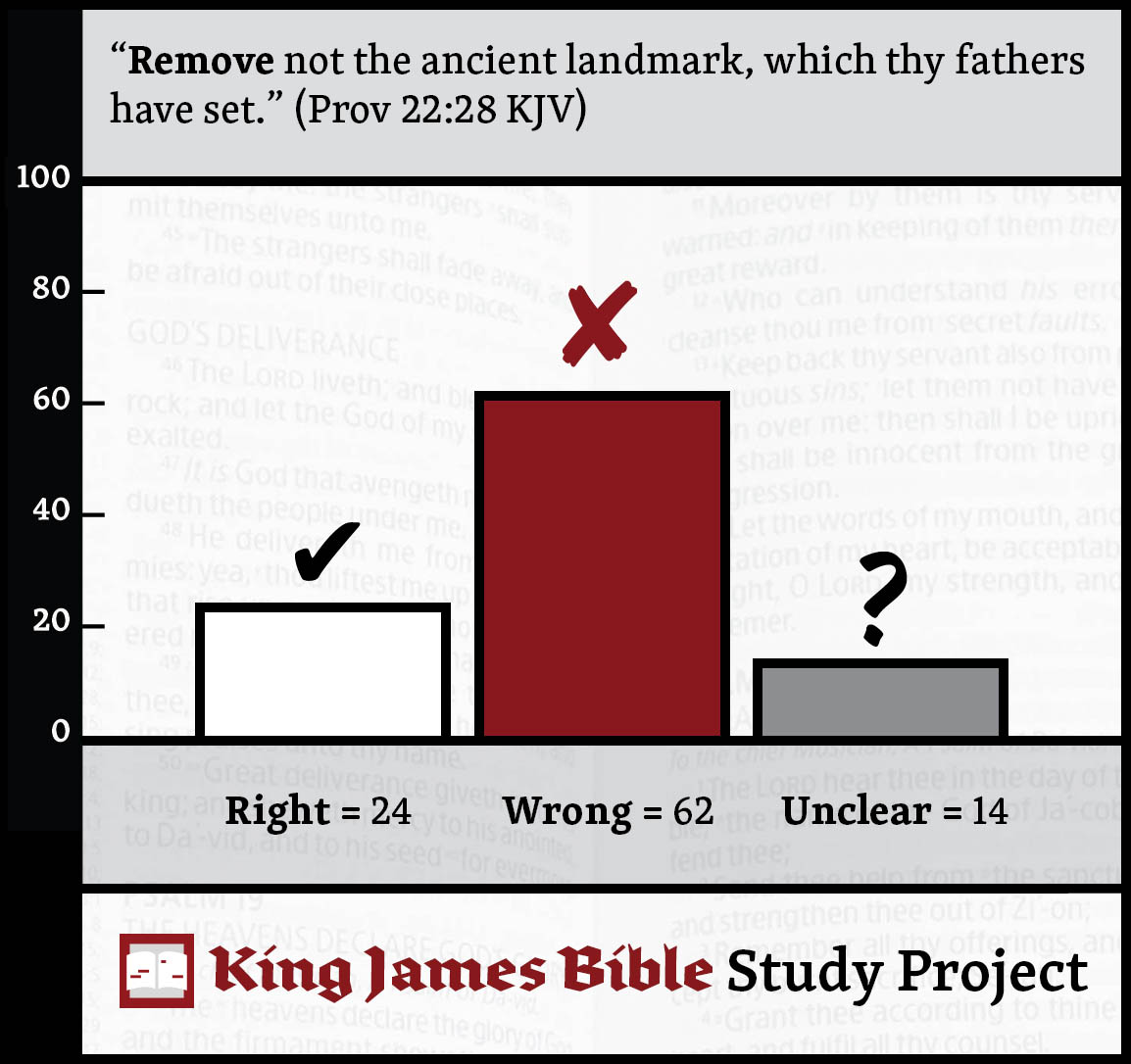
Question
What does “remove” mean?
Correct Answer
- The Hebrew here means “to displace [that is, to ‘cause (something) to move from its proper or usual place’] a boundary mark.” (HALOT/NOAD)
- In 1611 “remove” in a context like this meant “to change position; to move a short distance or in a certain direction.” (OED)–just like the Hebrew. That sense, however, is marked as “Obsolete” in the OED.
- Today, “remove” means to “take (something) away or off from the position occupied” or to “ eliminate or get rid of” (NOAD). This is just what the KJV-Only pastors tended to think the phrase meant. They thought of the landmark as something taken away, not something moved.
Watch a video explaining this false friend
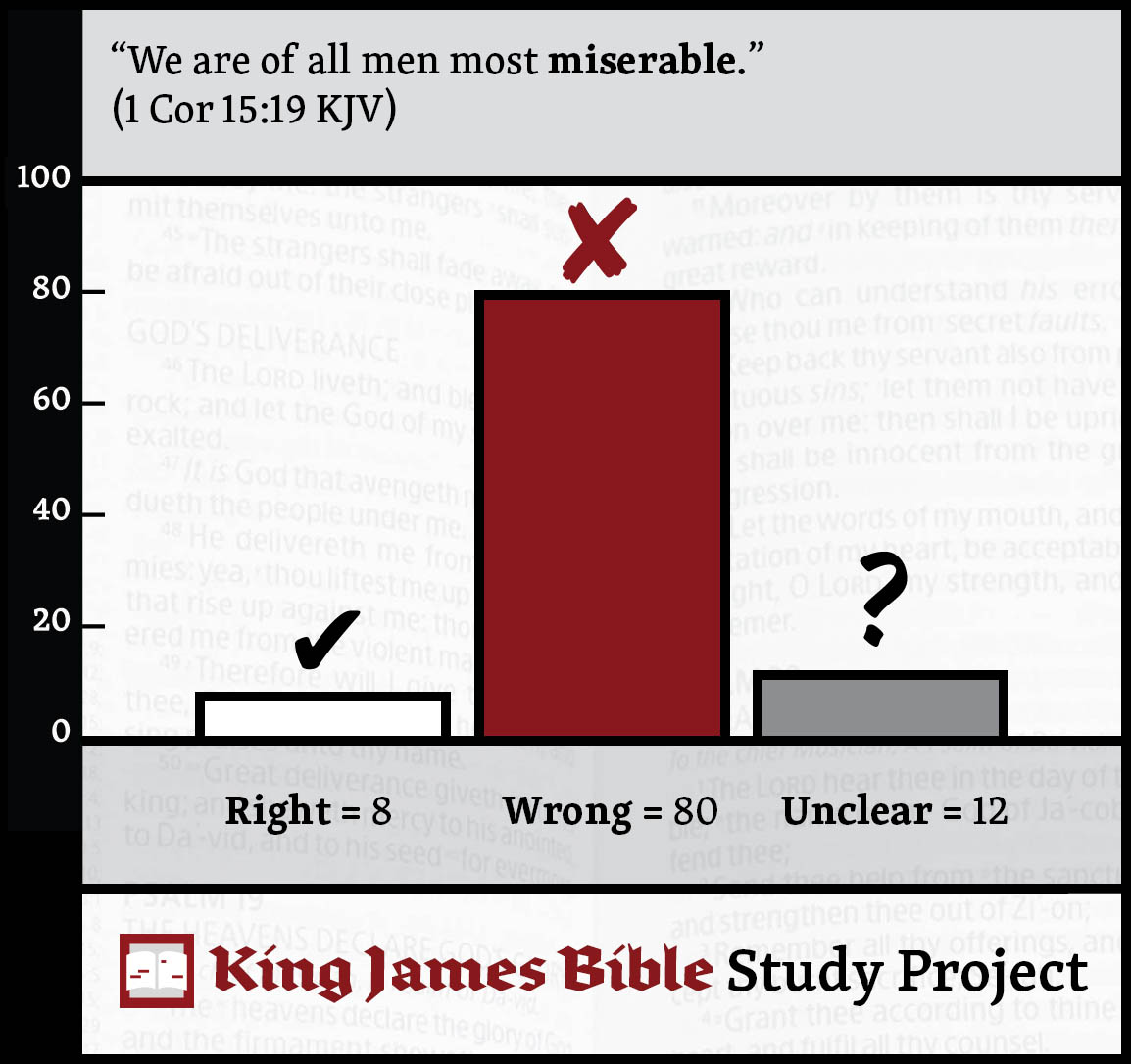
Question
What does “miserable” mean?
Correct Answer
- The Greek here means “being deserving of sympathy for one’s pathetic condition” (BDAG).
- In 1611 “miserable” in a context like this meant “Living or existing in a state of external distress or misery; that is in a wretched condition” (OED)–just like the Greek.
- Today, however, “miserable” means “ wretchedly unhappy” (NOAD). In other words, where the Greek focuses on the external condition, the English word has come over time to focus on the internal emotional state. This is just what the KJV-Only pastors tended to think the word meant.
Watch a video explaining this false friend
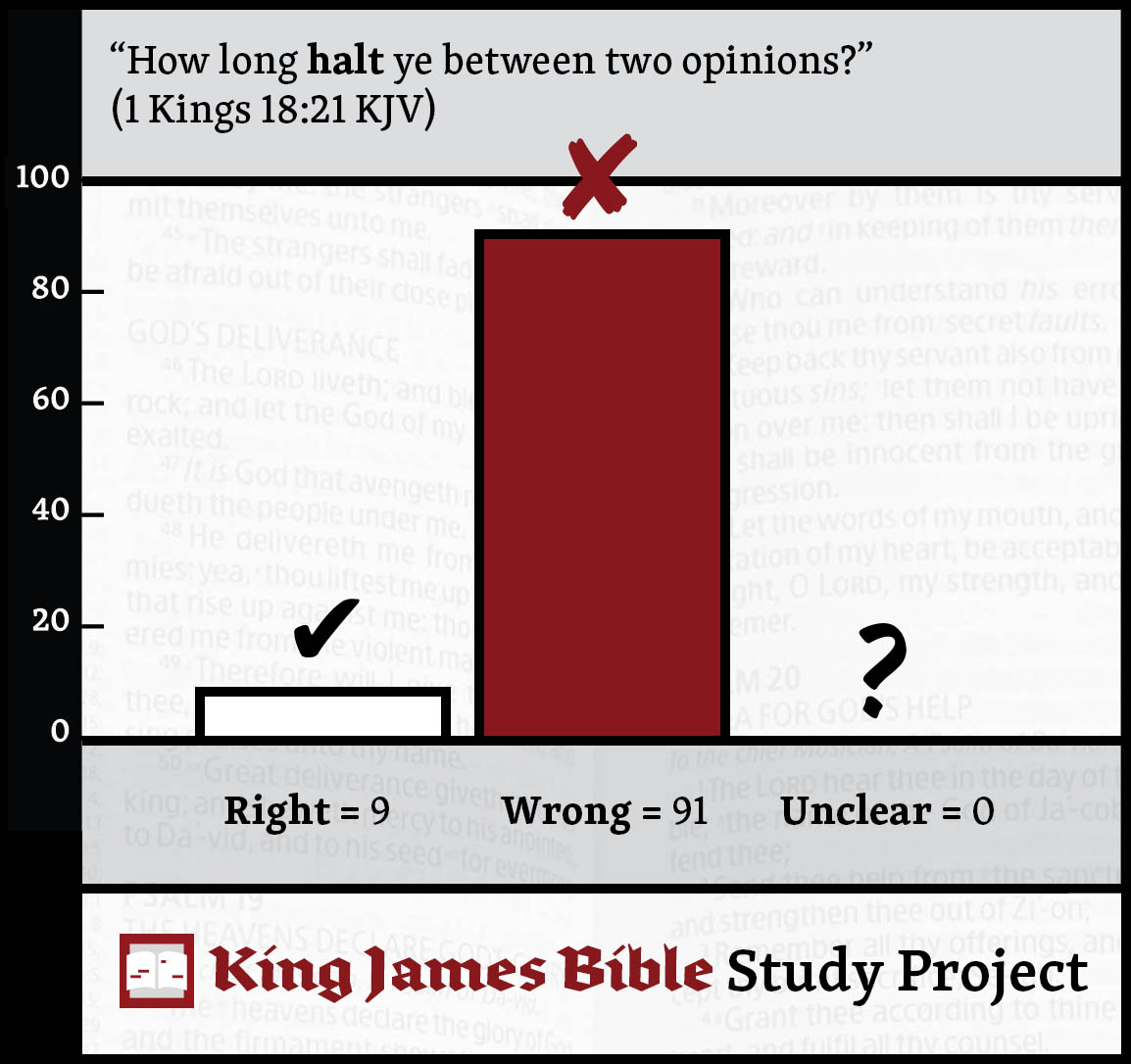
Question
What does “halt” mean?
Correct Answer
- The Hebrew here means “to be lame, limp” (HALOT).
- In 1611 “halt” in a context like this meant “to be lame, walk lame, limp” (OED)–just like the Hebrew. That sense, however, is marked as “archaic” in the OED.
- Today, “halt” in a context like this means “come to an abrupt stop” (NOAD). This is what many KJV-Only pastors tended to think the word meant—though they often gave the meaning of the whole phrase and not of the word.
Watch a video explaining this false friend
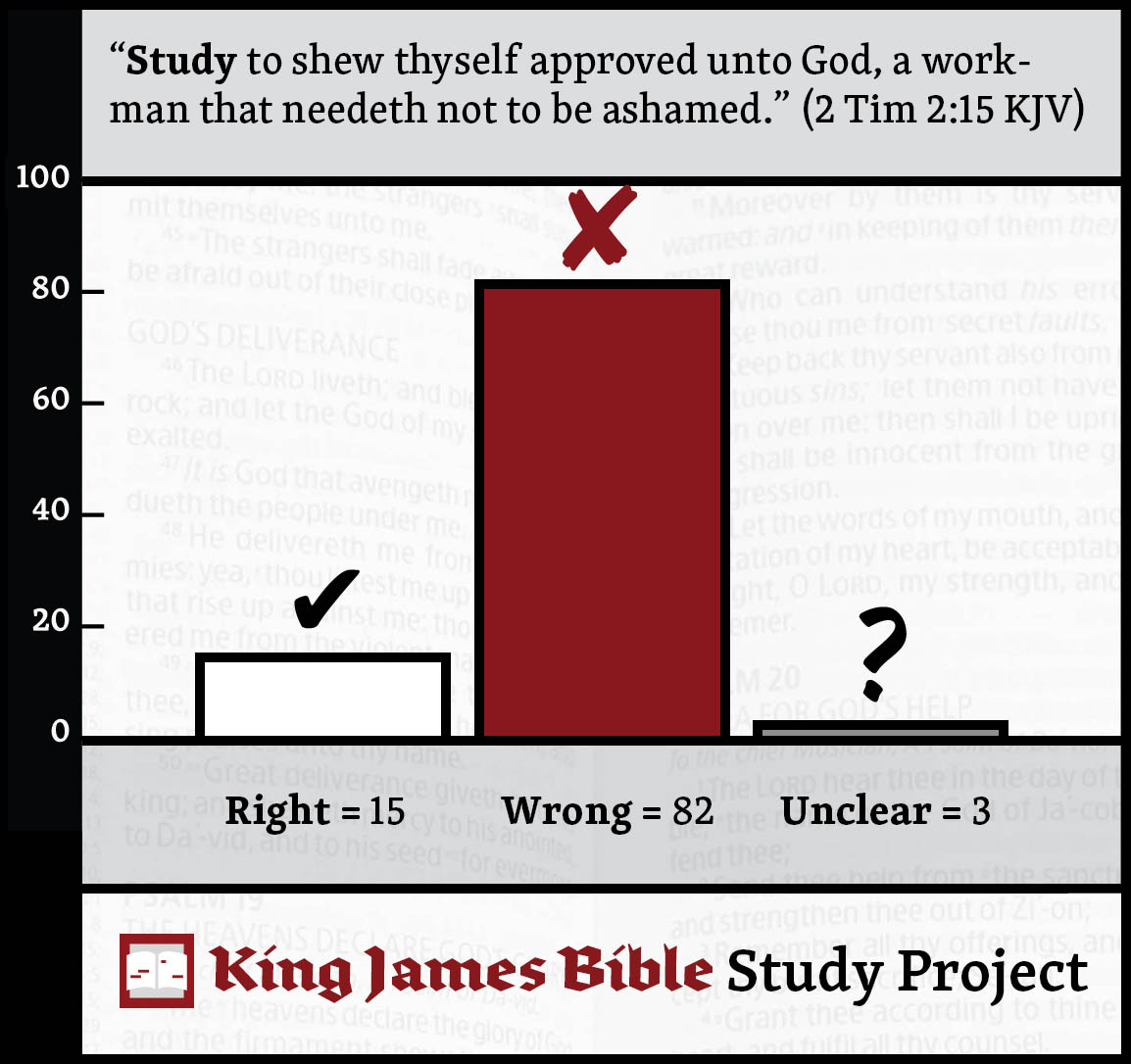
Question
What does “study” mean?
Correct Answer
- The Greek here means “to be especially conscientious in discharging an obligation” (BDAG).
- In 1611 “study” in a context like this meant “to strive towards, direct one’s efforts to, set one’s mind on, devote oneself to” (OED)–just like the Greek. That sense, however, is marked as “Obsolete” in the OED.
- Today, “study” means “ the devotion of time and attention to acquiring knowledge on an academic subject, especially by means of books” (NOAD). This is just what nearly all the KJV-Only pastors thought the word meant.
Watch a video explaining this false friend
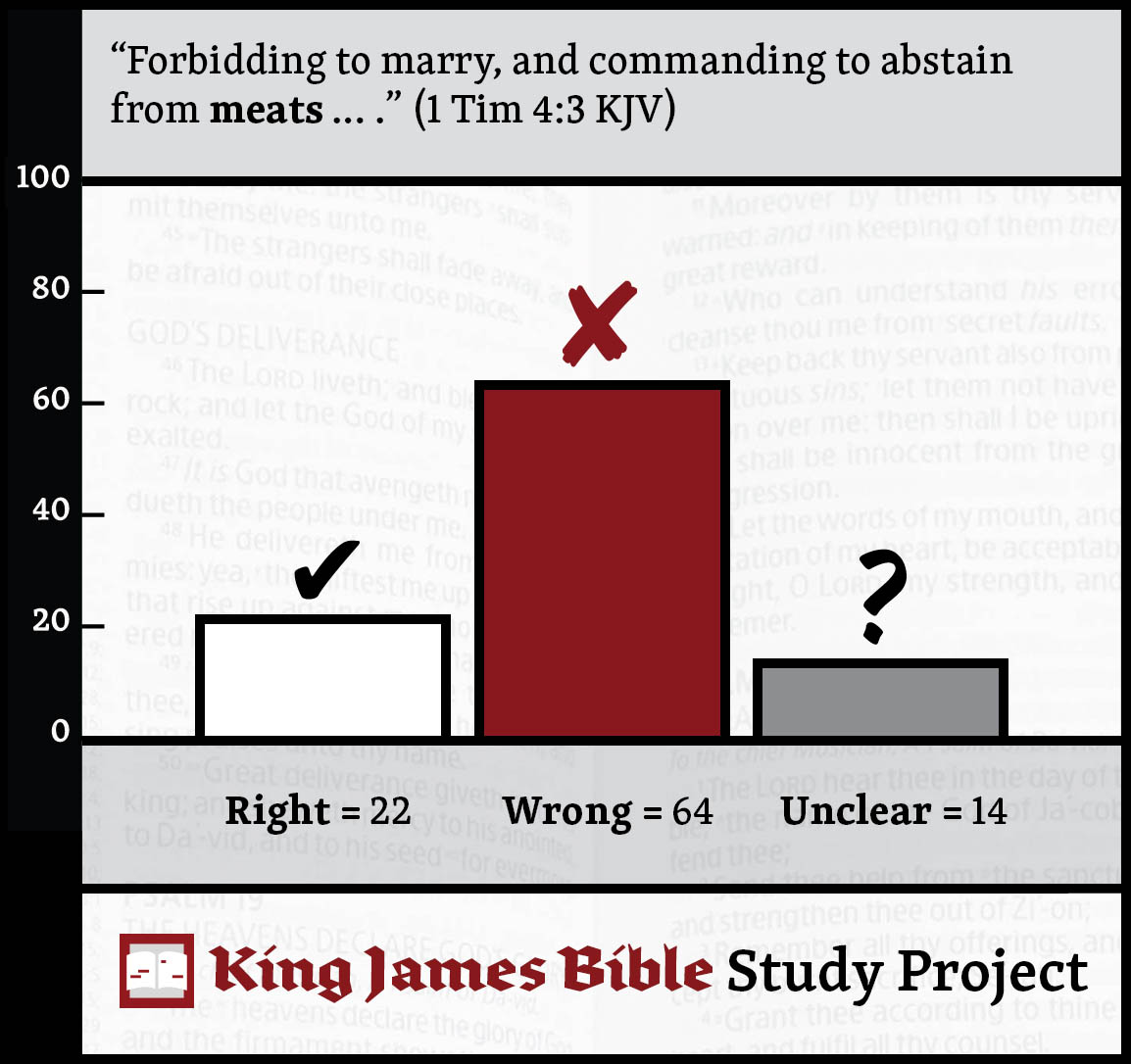
Question
What does “meats” mean?
Correct Answer
- The Greek here means “food” (BDAG).
- In 1611 “meat” in a context like this meant “food” (OED)–just like the Greek. That sense, however, is marked as “archaic” in the OED.
- Today, “meats” means “the flesh of an animal …as food” (NOAD). This is just what the KJV-Only pastors tended to think the word meant.
Watch a video explaining this false friend
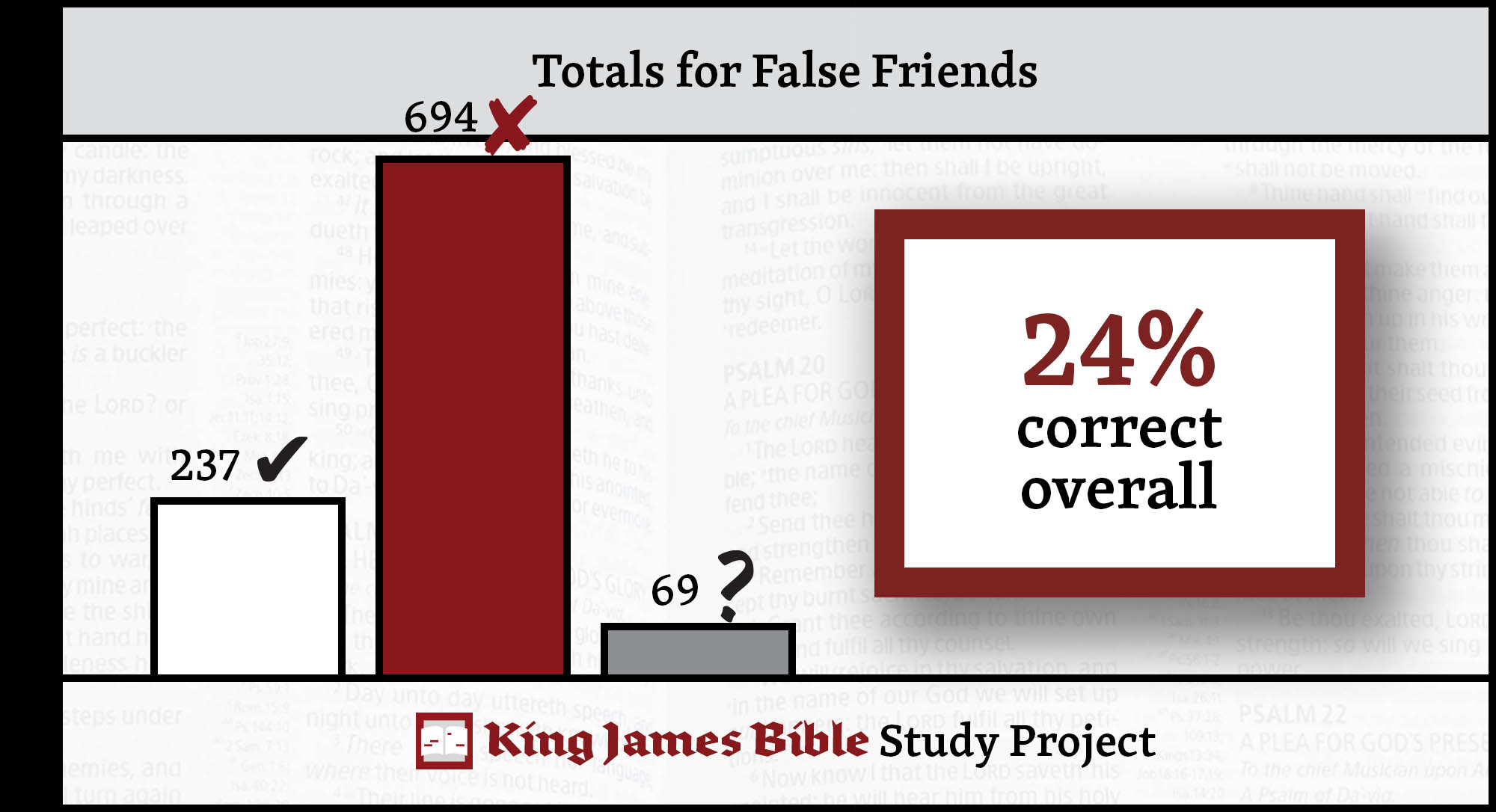
Full video explanation and assessment from Mark Ward of the false friends pronoun portion of the survey.
The point of the survey is not to mock anyone for their ignorance, because it is no one’s fault that language change has decreased contemporary readers’ ability to understand all the many words in the classic King James Bible.
The point of the survey, which was sponsored by the Textual Confidence Collective, was to appeal to an area of common ground in the unfortunate disputes about Bible translation that have riven portions of the English-speaking church. All Christians want to understand God’s Word. Those who read Scripture in the King James, especially if they do so exclusively, need to be made aware of the unfortunate misunderstandings that can arise—due to no fault in the KJV, and to no fault in contemporary readers, but due solely to the effects of language change.


